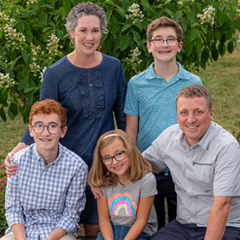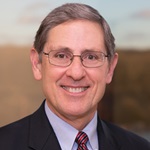Marianne’s Story: Self Examination Stops Cancer
 “Cancer” is a word that Marianne Requarth never thought she would hear from her own doctor. The 41-year-old mother of three from Centerville thought she was too young to receive such a diagnosis.
“Cancer” is a word that Marianne Requarth never thought she would hear from her own doctor. The 41-year-old mother of three from Centerville thought she was too young to receive such a diagnosis.
On a cold Saturday morning in February 2019, Marianne felt a lump on her right breast during a self-examination.
“I remember calling my OB/GYN to set up an appointment, just to be sure,” recalls Marianne. “I figured it was nothing. I didn’t even want to tell my husband about it, because I knew everything would be fine.”
Marianne describes herself as active. She loves attending her children’s sporting events, hiking outdoors, and spending time with her friends.
“I’m energetic and a typical mother of three kids,” says Marianne. “I couldn’t imagine having any major health problems.”
In May 2018, at age 40, Marianne had her first mammogram that came back negative. Nine months later, after finding a lump on her breast, she went to Miami Valley Hospital South in Centerville. This time, the mammogram detected a two-centimeter lump.
“The radiologist wanted to bring me in for a biopsy,” says Marianne. “I told her I figured she wanted to rule everything out. That’s when she looked at me, took my hand, and said, ‘Marianne, this is going to come back as some type of cancer.’”
Marianne remembers receiving the news that she likely had breast cancer.
“I was completely unprepared to hear that,” explains Marianne. “I felt like I was in a movie – everything stopped, and someone was talking to you, but you can’t process what they’re saying.”
In total disbelief, Marianne remembers calling her husband, unable to find the words to describe her devastation.
“I was saying that I’m not ready – this isn’t going to be it,” remembers Marianne. “I want to see my kids grow up, I want to see them get married, I want to see my grandchildren.”
A few weeks later, Marianne learned she had grade 3 invasive ductal carcinoma, the most common type of breast cancer.
Marianne met with Thomas Heck, MD, of Gem City Surgeons in Englewood. After their consultation, Marianne decided to have both of her breasts removed.
“Patients often worry about a mastectomy and how that may impact them,” says Dr. Heck. “All of these things are talked about before we go to surgery. We want to provide the patient with the best options possible to treat the cancer, but also with the image where they will feel most comfortable.”
According to the American Cancer Society, more than 180,000 women in the United States find out they have invasive breast cancer each year.
Marianne’s care team concluded that she would need 16 rounds of chemotherapy. She would have chemo every two weeks for the first four rounds, followed by every week for the remaining 12 rounds.
“Collaboration before developing a treatment plan is unique,” says Dr. Heck. “To be able to collaborate with everyone involved from the breast surgeon, radiologist, plastic surgeon, medical oncologist, radiation oncologist – all of these different factors may come into play for a patient.”
“Even though they caught it early, because it was such an aggressive form of cancer, they wanted to make sure there was no cancer cell left,” explains Marianne.
In June 2019, Marianne began her chemo treatments at Miami Valley Hospital South. Ultimately losing her hair and experiencing nausea and fatigue, Marianne said chemo would not slow her down. She continued to be active and involved in her children’s lives, as well as going to work every day.
“You have to come in with a positive attitude,” explains Dr. Heck. “You have to rely on your family and your support systems to have that positive approach to treat any cancer. Marianne is such a great example of that. She, from the get-go, came in and said she wanted to treat this cancer and beat it.”
Marianne says the support of her family and friends is what kept her motivated through such a difficult diagnosis.
“I could not have gotten through those 16 rounds of chemo without my family,” says Marianne, emotion in her voice. “My husband took on the role as caregiver and he made sure that I was eating, drinking, and comfortable.”
In November 2019, Marianne completed her final round of chemotherapy. She says a self-examination on a cold morning in February likely saved her life.
“I think that was my saving grace,” says Marianne. “It may be a little bit of divine intervention, but somebody, somewhere was looking out for me that morning.”
Now, in what she calls her “regrowth period,” Marianne reflects on seeing herself in the mirror – a stronger and braver woman who is now a breast cancer survivor.
“When I look in the mirror, it’s still someone I don’t completely recognize, just because my hair is growing back and everything,” explains Marianne. “I look at myself, however, and recognize that I did this, and it was the biggest challenge of my life.”
2020 was supposed to be Marianne’s “comeback year.” She plans on seeing the world with her family, once life returns to some sense of normalcy.
“With COVID-19, some of our celebrations didn’t happen,” says Marianne. “But we want to take a big family trip with the five of us. Having that experience and having this time with our kids, we’ll use that as our big celebration.”
Early detection played a key role in Marianne's cancer journey. Having a yearly mammogram starting at age 40 is recommended for early detection.
You can schedule a screening mammogram online, or call (855) 887-7364 (855) 887-7364 Monday through Thursday, 7:30 a.m. to 7 p.m., or Friday, 7:30 a.m. to 6 p.m. Women without insurance coverage may be eligible for a free mammogram or other women’s health services. Call (866) 838-8973(866) 838-8973 to see if you qualify.

Contact Us
Call the Premier Health cancer hotline at (844) 316-HOPE(844) 316-4673 (4673), Monday through Friday, 8 a.m. to 5 p.m., for more information.

